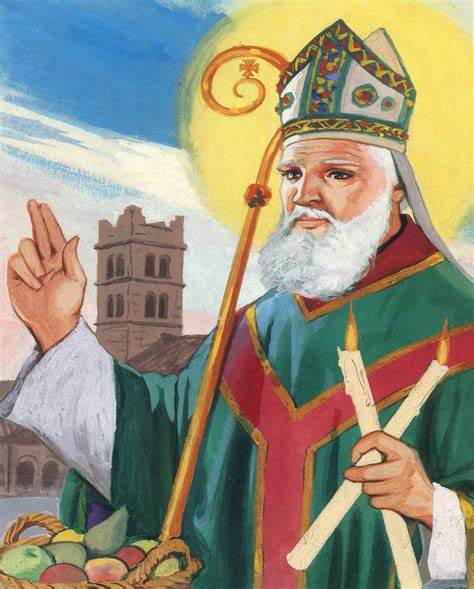St. Blaise
| Feast day | September 25 |
| Patron | of Cork, Diocese of Cork |
| Birth | 550 |
| Death | 620 |
St. Blaise was the bishop of Sebastea and a doctor. The first known record of the saint’s life comes from the medical writings of Aëtius Amidenus, where he is recorded as helping with patients suffering from objects stuck in their throat. Many of the miraculous aspects of St. Blaise’s life are written of 400 years after his martyrdom in the “Acts of St. Blaise.”
Saint Blaise is believed to begin as a healer then, eventually, became a “physician of souls.” He then retired to a cave, where he remained in prayer. People often turned to Saint Blaise for healing miracles.
In 316, the governor of Cappadocia and of Lesser Armenia, Agricola, arrested then-bishop Blaise for being a Christian. On their way to the jail, a woman set her only son, who was chocking to death on a fish bone, at his feet.
Blaise cured the child, and though Agricola was amazed, he could not get Blaise to renounce his faith. Therefore, Agricola beat Blaise with a stick and tore at his flesh with iron combs before beheading him.
In another tale, Blaise was being led to the prison in Sebastea, and on the way came across a poor old woman whose pig had been stolen by a wolf. Blaise commanded the wolf return the pig, which it did -alive and uninjured – to the amazement of all.
When he reached Sebastea, the woman came to him and brought two fine wax candles in an attempt to dispel the gloom of his darkened cell.
In the Middle Ages, Blaise became quite popular and his legend as a beast tamer spread. He was then referred to as the “saint of the wild beast.”
Many German churches are dedicated to Saint Blaise, sometimes called Saint Blasius.
In Great Britain, the village of St. Blazey got its name from Saint Blaise, and a church dedicated to the saint can be found in Decon hamlet of Haccombe, near Newton Abbot.
There is a Saint Blaise’s Well in Kent, and the water is believed to have medicinal properties. A Blessing of the Throats ceremony is held every February 3 at Saint Etheldreda’s Church in Londan and Balve, Germany.
A Catholic middle school was named after Saint Blaise in Bradford, West Yorkshire. The name was decided upon when the link between Bradford and the woolen industry was connected to the way St. Blaise was martyred: with woolcomb.
Saint Blaise is often depicted holding two crossed candles in his hand, or in a cave with wild animals. He is also often shown with steel combs. The similarity of the steel combs and the wool combs made a large contribution to Saint Blaise’s leadership as the patron saint of wool combers and the wool trade.
Views: 2
